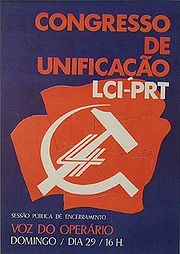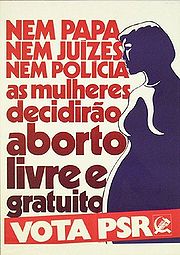
Revolutionary Socialist Party (Portugal)
Encyclopedia




Portugal
Portugal , officially the Portuguese Republic is a country situated in southwestern Europe on the Iberian Peninsula. Portugal is the westernmost country of Europe, and is bordered by the Atlantic Ocean to the West and South and by Spain to the North and East. The Atlantic archipelagos of the...
, founded in 1978 after the merger of two Trotskyist parties - the Internationalist Communist League
Internationalist Communist League (Portugal)
Internationalist Communist League was a Trotskyist political party in Portugal. LCI was founded in 1973. It became the Portuguese section of the reunified Fourth International...
(Portuguese: Liga Comunista Internacionalista or LCI) and the Workers Revolutionary Party
Workers Revolutionary Party (Portugal)
Workers Revolutionary Party was a trotskyist political party in Portugal. PRT was founded on January 31, 1975. PRT published Combate Socialista....
(Portuguese: Partido Revolucionário dos Trabalhadores or PRT). The LCI and PRT were both part of the reunified Fourth International
Reunified Fourth International
The Fourth International is a Trotskyist international. In 1963, the majorities of the two public factions of the Fourth International, the International Secretariat and the International Committee, reunited, electing a United Secretariat of the Fourth International...
. The International recognised the PSR as its Portuguese section.
In 1998 Party renamed itself in order to join with some other left-wing parties in founding the Leftwing Bloc (Portuguese: Bloco de Esquerda or BE). The organisation retains the acronym PSR, and has become the association "Revolutionary Socialist Politics". The historical leader of the PSR is Francisco Louçã
Francisco Louçã
Francisco Anacleto Louçã is a Portuguese economist and politician, first elected in 1999.. He is the son of António Seixas Louçã, who commanded a ship on the Tagus River during the Carnation Revolution, and wife Noémia da Rocha Neves Anacleto , a lawyer.Louçã was an active opponent of the...
, now a leader of the Leftwing Bloc.
The Party had never achieved parliamentary representation before the merger in the Leftwing Bloc, although it may be considered the 3rd or 4th biggest left-wing Party in the country.
In the 1970s
In 1979, the Party ran in a legislative electionPortuguese legislative election, 1979
The Portuguese legislative election of 1979 took place on December 2. The last election, three and a half years before, in April 1976, was won by the Socialist Party under the lead of Mário Soares, who became the Prime-Minister of the 1st Constitutional government after the revolution...
for the first time, achieving 0.6% of the voting. In the next year, another legislative election
Portuguese legislative election, 1980
The Portuguese legislative election of 1980 took place on October 5.In January 1980, the Democratic Alliance, which had won the previous election, on December 2 of 1979, entered office with Francisco Sá Carneiro leading the government...
took place and the Party achieved 1.0% of the votes.
In the 1980s
In 1983, the Party ran in the legislative electionPortuguese legislative election, 1983
The Portuguese legislative election of 1983 took place on April 25. The last election, in October 1980 had been won by a right-wing coalition, the Democratic Alliance and Francisco Sá Carneiro had retained office as Prime Minister with an increased majority...
in coalition with the People's Democratic Union
People's Democratic Union (Portugal)
The People's Democratic Union is a marxist political movement in Portugal. The UDP transformed itself into a political association at its 15th congress due to its merger with other left-wing parties in the Left Bloc....
(Portuguese: União Democrática Popular or UDP) in some constituencies, receiving 0.4% in those constituencies and 0.2% in the others
In 1985, after some splits, the Party gained a new life, mainly due to its anti-militaristic
Anti-war
An anti-war movement is a social movement, usually in opposition to a particular nation's decision to start or carry on an armed conflict, unconditional of a maybe-existing just cause. The term can also refer to pacifism, which is the opposition to all use of military force during conflicts. Many...
and anti-racist campaigns and in that year's election
Portuguese legislative election, 1985
The Portuguese legislative election of 1985 took place on October 6. In June of the same year, the former Prime-Minister, Mário Soares, had resigned from the job due to the lack of parliamentary support, the government was composed by a coalition of the two major parties, the center-right Social...
, the PSR got 0.6% of the vote. In 1987, the Party contested the first European Election held in Portugal, achieving 0.5%, and in the legislative election
Portuguese legislative election, 1987
The Portuguese legislative election of 1987 took place on July 19. In the last election, in 1985, the Social Democratic Party had achieved a relative majority, thing that made its government very weak, managing to survive in coalition with the Democratic Social Center and the Democratic Renovator...
, achieving 0.6%.
Also in 1987, the Party started publishing of the Combate (Struggle) monthly newspaper, which the PSR association continues. In elections for the European Parliament of 1989, the PSR got 0.8%.
In the 1980s
In the legislative election of 1991Portuguese legislative election, 1991
The Portuguese legislative election of 1991 took place on October 6. The Social Democratic Party, under the lead of Cavaco Silva, won a historic third term and won with an absolute majority for the second consecutive turn, achieving a higher share than in the previous election, losing, however, 13...
got 1.12%, the best result in the Party's history. It ran for the last time in an election in 1995, achieving 0.6%.
Leftwing Bloc
In 1998, the Party formed a coalition with the People's Democratic Union (Portugal)People's Democratic Union (Portugal)
The People's Democratic Union is a marxist political movement in Portugal. The UDP transformed itself into a political association at its 15th congress due to its merger with other left-wing parties in the Left Bloc....
, the Politics 21 and the Revolutionary Front of Left, creating the Bloco de Esquerda (Leftwing Bloc). In 2005, in the last congress in the Party's history, it ceased to be a party, being now a political association, due to the good results of the Leftwing Bloc's existence.

